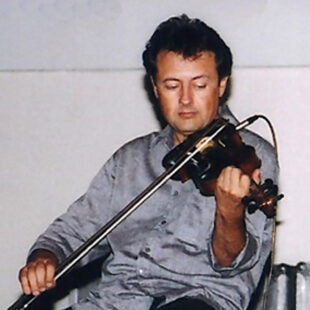00:00
Home / Her Work / Song Catalogue / A Maid Was Singing
A maid was singing in a high-walled palace.
The wind swept her voice out to sea
and every ship that heard it reefed its sails.
Save one love-lorn ship that knows what friendship means,
that neither gathering its sheets nor lowering them,
trimmed its sails and set a course for her voice.
“Sweet maid, sing another air, choose a different song”.
“How can I sing another air, how can I choose a different song,
whatever I sang, I sang in lamentation.
I have a husband in a foreign land, a brother far from home.
[My man took to his bed and asked me for a cure,
seeking water from his village, an apple from his tree,
a grape from the vine that grows before his door.
By the time I’d fetched the water, by the time I’d picked the apple,
my husband was well and in love with another.
I have the urge to curse him, but I pity him still.
May he be strung up high and fall down low.
May the earth turn razor-sharp and cut his flesh to shreds
and I a passer-by passing by that way.
Physicians, fight the good fight, for you’re fighting it well,
sharpen your knives and cut, then cut some more.
I’ve full sixty foot of cloth upon my loom,
fifteen for lint and fifteen for fuses,
and the rest for binding his wounds”.]
Translated by Michael Eleftheriou
Κοράσιν ετραγούδαγε σ’ ένα ψηλό παλάτι
κι επήρ’ αγέρας τη φωνή στα πέλαγα την πάει.
Κι όσα καράβια τ’ άκουσαν όλα πανιά εμαϊνάραν.
[Κι ένα καράβι της φιλιάς, καημένο της αγάπης,
ούτε μαϊνάρει τα πανιά ούτε τα παίρνει κάτου,
τα μπάσο μούδο τα ’ριξε1 και στη φωνή πηγαίνει.]
«Κόρη μ’, άλλαξε τον σκοπό [και πες άλλο τραγούδι».]
«Και πώς ν’ αλλάξω τον σκοπό, να πω άλλο τραγούδι;
Εγώ κι αν ετραγούδησα για μοιρολόι το ’πα:
έχω άντρα στην ξενιτιά, [έχω αδελφό στα ξένα.
Κι ο άντρας μ’ βαριαρρώστησε και γιατρικά γυρεύει,
θέλει νερό απ’ τον τόπο του και μήλ’ απ’ τη μηλιά του,
σταφύλι από το κλήμα του οπο’ ’χει στην αυλή του.
Όσο να πάγω για νερό να φέρω και το μήλο,
ο άντρας μου ξαρρώστησε κι άλλη αγάπη πήρε.
Κάνω να τον καταραστώ και πάλι τον λυπούμαι.
Από ψηλά να γκρεμιστεί στα χαμηλά να πέσει
κι η γης ξουράφια να γενεί και να τον πετσοκόψει.
Κι εγώ διαβάτης να γενώ κι από ’κεί να περάσω.
Καλώς τα κάνετε, γιατροί, καλώς τα πολεμάτε,
’κονίστε τα μαχαίρια σας, κόφτε και μη λυπάστε.
Έχω πανί στον αργαλειό σαράντα πέντε πήχες,
τις δέκα τ’ς έχω για ξαντό, τις δέκα για φιτίλι
και τ’ς άλλες τ’ς αποδέλοιπες να δένει τις γιαράδες».2]
1τα μπάσο μούδο τα ’ριξε: τα έδεσε χαμηλότερα
2γιαράδες: πληγές
Any number of lengthy songs tell of maids betrayed by the men they love. While in some, the female protagonist counts the months as her pregnancy becomes increasingly obvious, in others they die, and in others still —this being one such case— they embark on a quest for some impossible cure for their sick husband, only to be discarded for another woman. The sheer force of their grievances —with which we can assume every audience was familiar— upsets the natural order of things: ships change course, bridges crack, rivers stand still and spirits stir. Unable to change fate, the spurned woman resorts to the only weapon available to her in a patriarchal societies: her curse, seeking divine justice for the terrible injustices she has suffered. (See also A Fair Maid Did Sing.)
Miranda Terzopoulou (2008)
It was recorded in a studio in 1989 and included in the album Songs About Greeks Far From Home. For this edition, the sound has been newly remastered. Based on Simon Karas’ recording which belongs to the Association for the Dissemination of Greek National Music.
Yet my most vivid memory is from when we were preparing “Songs About Greeks Far From Home” (1989), and she came out of the recording booth after singing —in one single take!— the song The Maid Was Singing Longingly, with all the maturity of her long artistic journey distilled into her voice and interpretation. I remember her coming out with tears in her eyes; she looked at us —at Socrates Sinopoulos (who then, at just 16, was playing the lyra with her for the first time) and at me— and said: “This is the song I want you to remember me by!” A unique performance. And this CD, a truly unique production.
Lambros Liavas (2022)
Watch a different version of the song by Domna Samiou

Singers

Violin

Constantinopolitan lyra

Kanun